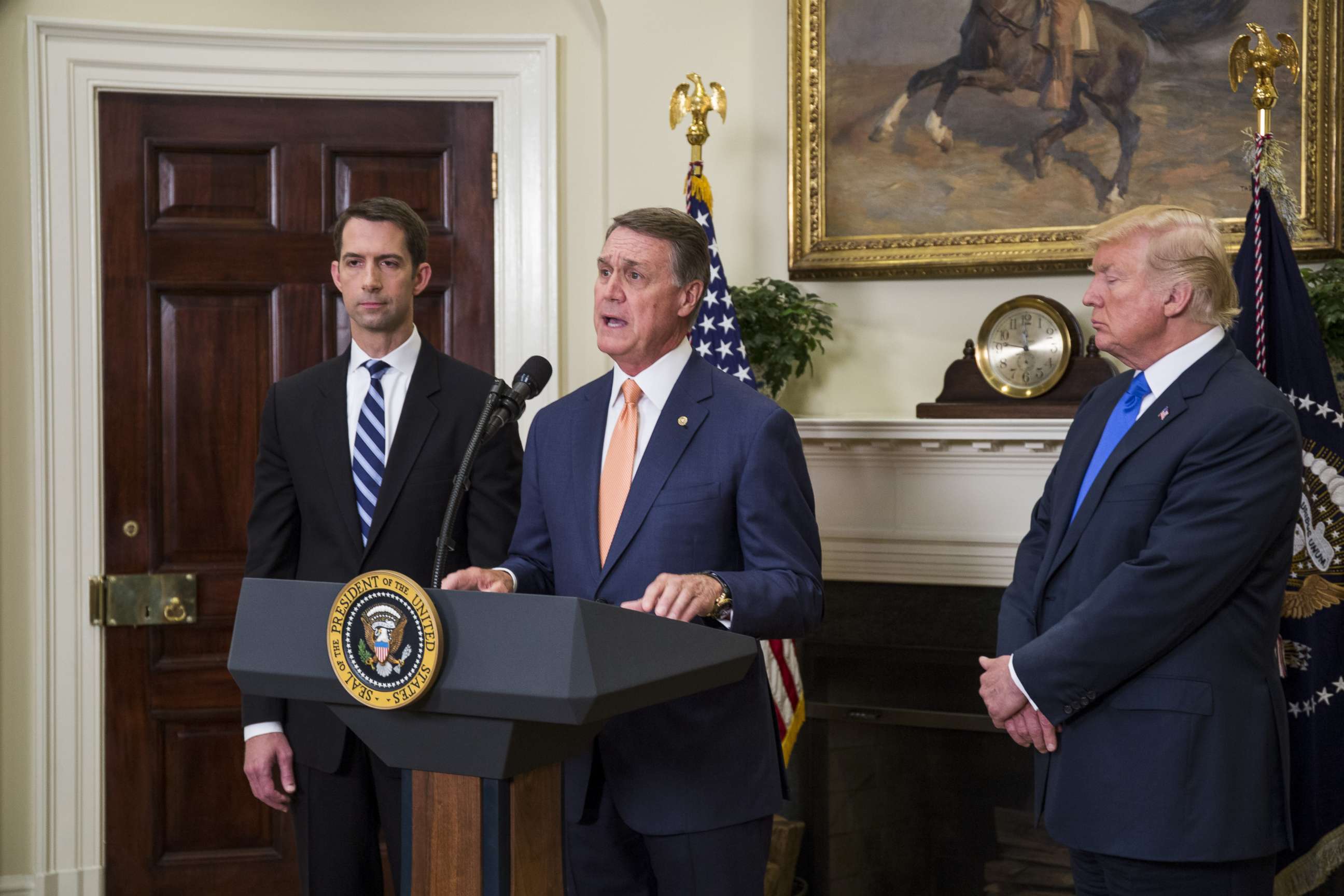What's in the Trump-backed immigration bill
The act would overhaul the permanent employment visa framework.
— -- President Donald Trump announced legislation Wednesday that would halve legal immigration numbers in 10 years. Trump joined Sens. Tom Cotton, R-Ark., and David Perdue, R-Ga., on Capitol Hill to present the Reforming American Immigration for a Strong Economy (RAISE) Act.
The bill aims to prioritize workers’ skills over family ties and would be the “most significant reform to our immigration system in half a century,” Trump said. The goal of the bill is to knock down the number of authorized immigrants to the U.S. each year from about 1 million to 500,000 by 2027.
The RAISE bill would cut out the four-tiered family immigration category for green cards, paving way for a new merit-based system that would prioritize high-skilled workers who are proficient in English and have “entrepreneurial initiative,” according to Cotton and Perdue, the bill’s sponsors.
“This competitive application process will favor applicants who can speak English, financially support themselves and their families and demonstrate skills that will contribute to our economy,” Trump said.
Minor children and spouses of Americans wouldn’t be affected, but Americans with elderly noncitizen parents abroad would have to file for a new renewable temporary visa for them to come to the U.S.
Under the current system, most authorized immigrants are admitted to the U.S. on the basis of family ties. American citizens may sponsor spouses, parents and minor children for visas, and the number issued in the family category is not capped. Siblings and adult children of Americans and children of green card holders may be sponsored too but are given lower priority.
Trump stressed that the new bill would “stop many immigrants from coming in and just immediately” accessing social welfare benefits and would require all immigrants to be able to “fully support themselves financially.”
The attention to public benefits in the bill comes on the heels of Trump’s announcement on June 21 in an Iowa rally that he wanted to bar new immigrants from being eligible for welfare for at least five years after arrival.
But federal law already bars most foreigners with immigrant visas from being eligible for federal benefits for their first five years in the country.
The RAISE bill would do away with another important category in the current system: the diversity lottery program.
The diversity visa allows 50,000 applicants from underrepresented countries to obtain permanent residency in the U.S. It bars applicants from major immigrant countries like India and China from applying.
Amid complaints of fraud and the case of the Egyptian terrorist Hesham Hadayet, who entered the U.S. via this program, the White House said it “serves questionable economic and humanitarian interests” and needs to be “eliminated.”
This element of Trump’s bill isn’t new to Congress. Four bills that would have ended the program failed to get enough votes to pass from 2007 to 2009.

Cotton, one of the bill’s creators, said that “only 1 in 15 out of a million new immigrants come here because of their job skills,” putting “great downward pressure on people who work with their hands and feet.” He added that the current system doesn’t attract “the very best talent” who can “stand on their own feet” and admits mostly low or unskilled workers into the country.
The bill was written to closely model the Canadian and Australian systems, which are “pro-worker, pro-growth and [have] proof of working,” according to Perdue, one of the bill’s authors.
The Australian and Canadian systems allocate permanent residency visas on the basis of demand for skills and professions the countries need.
RAISE has raised eyebrows in Congress and is facing major pushback.
Sen. Lindsey Graham, R-S.C., said that while he has always “supported merit-based” immigration, the bill would “devastate the South Carolina economy that relies on the immigrant workforce.”
“Dramatically reducing overall immigration levels won’t raise the standard of living for Americans,” said Randy Johnson, the senior vice president for labor, immigration and employee benefits at the U.S. Chamber of Commerce.
“In fact, it will likely accomplish the opposite, making it harder for businesses, communities and our overall economy to grow, prosper and create jobs for American workers.”
Sen. Kamala Harris, D-Calif., wrote on Twitter, “Immigrants helped build this country and continue to strengthen it today. The Raise Act is an attack on our values.”
“This is nothing short of an anti-immigrant and anti-family proposal from the GOP. I will make sure it is dead on arrival,” tweeted Rep. Joe Crowley, D-N.Y.
Rep. Judy Chu, D-Calif., tweeted a photo of the Statue of Liberty with the caption “Nevertheless she persisted” to mock senior White House adviser Stephen Miller’s defense of the bill today at a White House press briefing that Emma Lazarus’ “The New Colossus” poem was added to the statue “later,” — meaning the statue doesn’t symbolize open arms to immigration.




